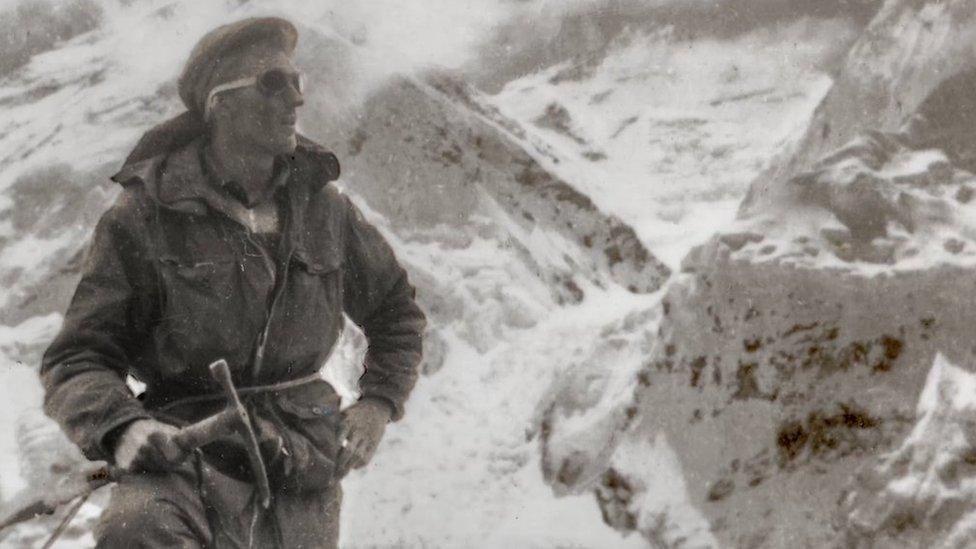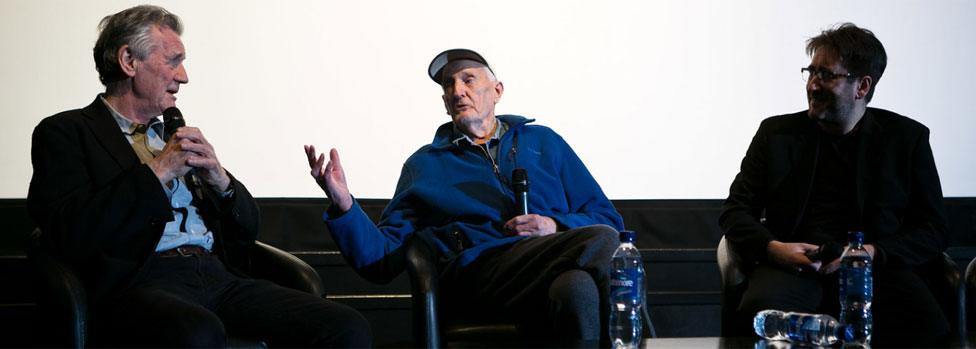Film charts climber Hamish MacInnes' mental health fight
- Published

Hamish MacInnes at the Glasgow premiere of the film Final Ascent
A film about a world-renowned Scottish mountaineer's struggles with mental health is to be screened in cinemas this month.
Dumfries and Galloway-born Hamish MacInnes, now 84, climbed the Matterhorn in the Alps when he was 16.
However, he later developed mental health issues and was eventually sectioned before making a recovery.
Final Ascent: The Legend of Hamish MacInnes is part of the Scottish Mental Health Arts and Film Festival (SMHAFF).
The festival's screenings will include a special preview and question and answer session with Mr MacInnes' friend, actor Sir Michael Palin, at London's Institute of Contemporary Arts on 7 May.

Mr MacInnes was a highly accomplished mountaineer
Final Ascent, which was given its premiere at the Glasgow Film Festival in March, will also be shown at venues across Scotland as part of the SMHAFF programme, external.
Cinemas in Edinburgh, Glasgow, Inverness and Stornoway will hold screenings.
Danger to himself
Mr MacInnes, who based himself in Glen Coe, founded the Search and Rescue Dog Association and set up the Scottish Avalanche Information Service.
He is credited with inventing climbing's first all-metal ice axe and a rescue stretcher.
He was also an adviser on Clint Eastwood's 1970s film The Eiger Sanction and also The Mission, starring Robert De Niro, in the 1980s.
Mr MacInnes, who was the first recipient of the Scottish Award for Excellence in Mountain Culture, was an explorer and a prolific inventor, building a car from scratch when he was 17.
More recently, he fell ill and was declared a danger to himself and sectioned.

Mr MacInnes with his friend Sir Michael Palin, left, and director Robbie Fraser at the films premiere
His ill health has included suffering from delirium, as well as psychogeriatric detainment in hospital. He made attempts to escape during his time in hospital.
Final Ascent's director Robbie Fraser said: "The struggle many people have with mental health, no matter what age they are, can be like a personal Everest.
"The remarkable thing about Hamish MacInnes is that he has conquered both the outward challenge of the mountains and the inner struggle to get his mind back after a devastating illness."
Mr Fraser said he was delighted to be showing the film at SMHAFF.
He added: "I hope the film finds a wide audience and that people who are going through difficult times are inspired by Hamish's example, and never give up."